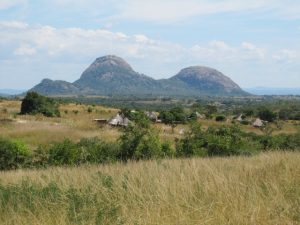Sekuru Tute Wincil Chigamba was born into a family of musicians, spirit mediums, and traditional healers on January 3rd of 1939 in the rural district of Guruve. This section of the site features a selection of vibrant stories describing his life in Guruve from 1939 to 1957, when he left in search of work as a migrant laborer.
Born during the height of the colonial era, many of Sekuru Chigamba’s early experiences were shaped by the repressive rule of the Rhodesian government. From 1944-46, Sekuru Chigamba lived at the farm workers’ compound on Morton Farm, a white-owned commercial farm where his father was employed as a cook. At Morton Farm, a Zambian dairy worker named Kachonda taught him to play a six-key karimba, marking Sekuru Chigamba’s first experience as a mbira player.
In 1946, Sekuru Chigamba returned to his family’s village, where he lived with his paternal grandmother, Manungwa. The following year, the colonial state seized the Chigamba family’s land as part of the widescale relocation of indigenous African people following the Land Apportionment Acts of 1930 and 1941. Forced to destroy their houses and relocate within an increasingly crowded “native reserve,” Chigamba family saw their old village sold to a white settler. At the same time, Sekuru Chigamba’s father and uncles continued working on nearby commercial farms out of economic necessity, resulting in their extended absence from village life.
Sekuru Chigamba’s lifelong involvement with music continued in the village, where he surreptitiously borrowed an acoustic guitar owned by one of his uncles, teaching himself to play. He also heard music at the mapira ceremonies he regularly attended with his father, and through his interactions with other adult relatives.
As a result, Sekuru Chigamba became familiar with several musical styles ranging from Guruve’s complex drumming, dance, and song-based ngoma traditions to single-stringed musical bows such as the chipendani and mukube. His stories offer vibrant accounts of many of these instruments and practices, from the uncensored songs of jakwara threshing parties to the insouciant lyrics of the kambuya-mbuya ground-bow he played as a herdboy.

